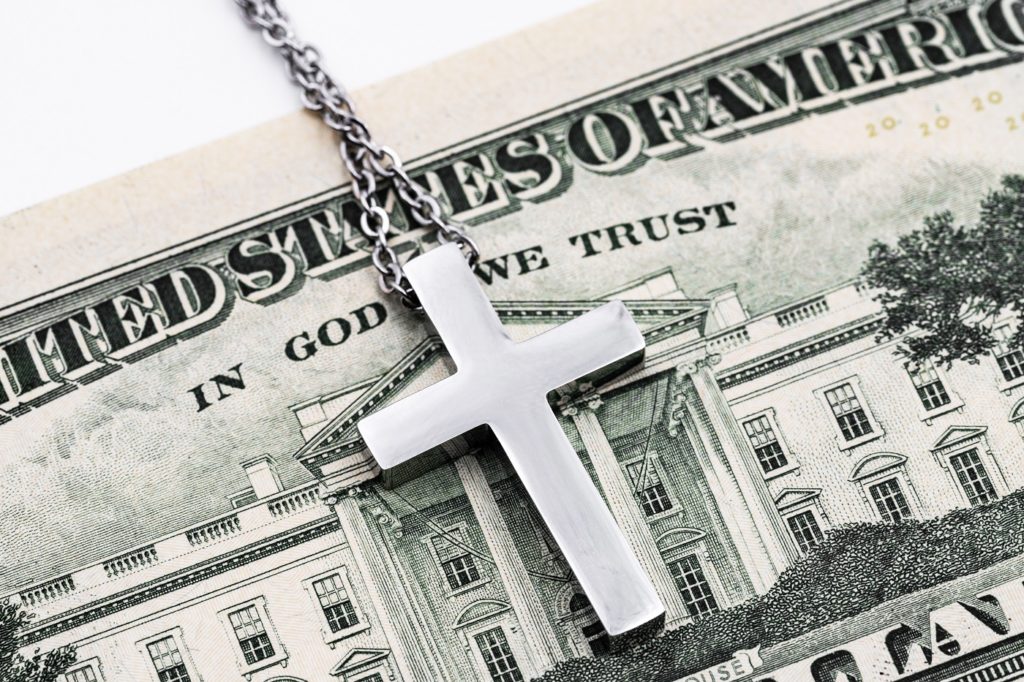In his recent piece in Public Discourse, “Credibility Requires Accountability: Monitoring Priests’ Cellphones,” Stephen Bainbridge applies economic analysis to the scandals involving priestly celibacy.
Since priestly celibacy is a credible signal of the priests’ beliefs, and the priest is the most integral agent in evangelization, Bainbridge reasons, transgression against celibacy “makes consumers less willing to purchase the Church’s main offering. The Church is thus impaired from carrying out its task of saving souls, and if one believes the Church’s teaching on eternity, at unimaginable cost to the lost.” The more offenses against celibacy, the more people will find the Church unattractive, leading to declining membership, and a loss of saved souls. As a last resort, Bainbridge concludes, the Church should consider a more strategic gathering of cellphone data from its employees (that is, priests) to determine how many are using dating apps.
Bainbridge is right that transgressions against the vows of priestly celibacy are worth the Church’s attention. Celibacy is an important discipline in Latin-rite Catholicism, at least since the Middle Ages. Further, hypocrisy is one of the reasons many men and women leave the Church or are unwilling to listen to difficult teachings. If a Catholic priest is engaged in prohibited liaisons with men or women, that priest’s own preaching and teaching become suspect. Even if Bainbridge’s claim that many people have left the Church because of transgressions of priests is not entirely supported by social scientific accounts of disaffiliation and affiliation, hypocrisy is a dilemma that the Church must respond to. St. Paul VI remains right that the modern person listens more to witnesses than to teachers; if they are to listen to a teacher, it is because he is also a witness.
Nonetheless, Bainbridge’s language is problematic. How? He takes an economic model and applies it to the event of salvation. The “consumer” Catholic is purchasing an economic good, and therefore he wants to get value out of his purchase. A hypocritical priest—one engaged in various sexual transgressions—renders the product suspect.
Start your day with Public Discourse
Sign up and get our daily essays sent straight to your inbox.I do not deny economists’ capacity to contribute to the mission of the Church. Catholic parishes, dioceses, and schools would be wise to employ their insights more frequently. Yet, at the same time, we must acknowledge that Christianity operates within a different economic system. The Church is defined first and foremost by God’s economy, a prodigality that interrupts the economy of exchange that characterizes day-to-day commerce. The application of economic models in ascertaining the Church’s capacity to evangelize must attune itself to this divine economy.
The Church is defined first and foremost by God’s economy, a prodigality that interrupts the economy of exchange that characterizes day-to-day commerce.
What Is God’s Economy?
When I teach the New Testament, I often begin by immersing students in the parables of the lost and the found in the Gospel of Luke, chapter fifteen. The shepherd who leaves the ninety-nine behind to look for a single sheep. The woman who aggressively searches her house for a lost coin, but who then spends everything on a party for her neighbors. The insulted father whose lost son demanded his inheritance, wasted it away on luxury, and then is greeted with a robe, a ring, and a banquet.
In teaching these parables, I underline the economic irrationality of the whole thing. When Jesus asks which shepherd wouldn’t leave the ninety-nine behind to search for a single sheep, the answer should be, “None of them would!” Not one. Not the rational ones, concerned with profit and cost. Let the lost sheep go! There are ninety-nine others, and they could be worth a lot.
Or the woman with a coin. Yes, I could imagine combing my house for a lost coin, especially if I didn’t have a lot of them. But then, why would I spend that coin on a party? I found it. Time to hunker down and maybe invest that coin.
Or the parable of the prodigal or lost son. What the lost son has done is outside the bounds of decency. He has wasted away his inheritance. He has declared his wish for his father’s death. But the father is so interested in conversion, in the possibility of return, that he gives so much upon the return. He proclaims (likely not for the first time) that the relationship he has with the son is not tit-for-tat. After all, this is the transgression of the elder son. He thinks he has earned the love of the father. He has given more “tit,” therefore he deserves more “tat.” The elder son needs to learn a new economy, the one bestowed on the younger son. The one given already to him, if only he recognized it. It is an economy neither earned nor seized. An economy exclusively of gift or grace.
The economics of the kingdom is gift. And this is the problem with applying contemporary economics to the Church. None of us are consumers. We are each in the position of both the younger son and the elder son alike. We have received what we did not deserve. We are not purchasing a darned thing. Salvation is bestowed in the Church as grace, as a gift, that is offered to all men and women.
That hypocritical priest who breaks his vows possesses the same offer I do. Love. A divine love that I did not earn but a love that is offered upon the cross. A love that is given in the Blessed Sacrament, where every man and woman is invited to the Supper of the Lamb.
This is the economics of the Church. It is not that the baptized Catholic is “purchasing” salvation. She is not a customer at all. She is a recipient of a gift beyond all gifts, something that none of us can earn.
It is not that the baptized Catholic is “purchasing” salvation. She is not a customer at all. She is a recipient of a gift beyond all gifts, something that none of us can earn.
The Challenge of God’s Economy in the Church
In the early Church, the heresies of Donatism and Pelagianism alike (both fought by Augustine) confused an economy of grace or gift for an economy of exchange. Donatism argued that Christian clergy must be sinless for their ministry to be effective and for sacraments to be valid. Pelagianism held that original sin did not taint human nature and humans have the free will to achieve perfection on their own. The Donatists wanted a pure church, without any flaw. Who wouldn’t? The Pelagian thought that our wills just need a little correction, and then we could achieve the salvation that each of us desired.
The problem is that none of us are flawless. And our flaws cannot be healed simply through a program of self-improvement. This is the genius of Augustine. None of us—hypocritical priest or virtuous baptized faithful—is worthy of grace. God is infinitely good, infinitely perfect, infinitely loving. We cannot purchase salvation or prove our worthiness. We receive a gift. We acknowledge that we are not worthy. And then we offer the return gift of our lives.
The return gift, of course, is important. God is not “love” in a kind of Pollyannish way. To receive infinite love is to want to return that love. And that normally means that I must change. I should love my neighbor. I should pray to the God who wants to enter union with me. I shouldn’t engage in sexual dalliances with men and women via Tinder, or Bumble, or Grindr.
But the economic categories applied by Bainbridge fundamentally misunderstand the nature of the Church in the first place. The Church in Augustine’s language is a corpus permixtum, a mixed body of sinners and saints. If we enter the Church imagining that we are joining some perfect body, then we will always be disappointed with our purchase.
Instead, we must recognize that ecclesial life is spousal. It is falling in love with Christ, who loves us enough to unite himself with a Church who is not always all that beautiful. Not always that virtuous.
And that union is what is meant to change us.
Ecclesial life is spousal. It is falling in love with Christ, who loves us enough to unite himself with a Church who is not always all that beautiful. . . . In this economy, therefore, the average Catholic should have room for scandal.
What About Scandal?
In this economy, therefore, the average Catholic should have room for scandal. Historically, there was never a time when all priests were faithful to celibacy. But that’s also true of the lay faithful. Human beings are notoriously difficult creatures. And since the Church is made up of those who are learning to abide within the divine economy, scandals will continue to arise.
This doesn’t mean we should not seek reform. After all, the call of the Christian is toward perfection. The perfection of total, self-giving love.
But in the meantime, there is no balance sheet. In love—especially divine love—there rarely is. At least from the perspective of evangelization, the real task is to proclaim anew the dazzling love of the kingdom of God. Not the sometimes saccharine love of the folk music of the 1960s, but a super-transcendent love that is made manifest upon the cross, that moves Christ to bend down and wash the feet of the twelve, most of whom would abandon him.
Bainbridge’s economic analysis of sexual scandals in the Church forgets this important dimension of the divine economy. Yes, the Church must be renewed, healed of her various wounds. Seminaries should protect seminarians from being groomed. Bishops and priests shouldn’t use apps like Tinder or Grindr to hook up. We need to find a way to respond to these sexual scandals. But gathering data on who may be breaking their vow of celibacy is applying the wrong economic model to the problem.
In the prodigality of God’s economy, bishops must become fathers to their priests. They need to open up avenues of communication with their clergy, understanding why some of them might be so lonely that they’re using dating apps. I know too many young, ordained men who have not had a significant conversation with their bishop since their ordination. Instead of fellow workers in the vineyard, they feel like poorly paid employees of a company whose headquarters never reaches out except when issuing a new regulation for running the franchise.
In these conversations, the bishop will learn that his priests are part of the corpus permixtum of the Church. The bishop will discover that he is part of this corpus permixtum. Surprisingly, that may in fact be good news. Bishop and priest alike can remember that they too need the healing gift of salvation, of a renewal that Jesus Christ alone can provide.
Within the economic model presented by Bainbridge, all of this seems rather naïve. Is confessing our sins and recognizing our frailty enough to bring people back to the Church? Don’t we need to purify the Church—even if it means collecting the cell phone data of priests—to increase the quality of the product, to woo men and women to the salvation offered by Christ?
Maybe. But after over ten years of teaching theology at Notre Dame, what I find my students are most attracted to is the brilliant, dazzling vocation of sanctity to which the Church calls every man and woman. This is a calling that calls us to perfection even as it recognizes the frailty of the human condition. Our priests are weak. The baptized faithful are weak. In fact, we confess this at the beginning of each Mass, when we each proclaim to one another: I am a sinner, someone who has both consciously and unconsciously sinned. This sin is my fault.
And yet, in this Church of sinners and saints, I find a communion that is healing. I discover anew my brokenness, which can only be mended by the total, dazzling love of seeing God face-to-face.
Until then, I am incomplete. A sinner among other sinners, receiving the grace to become a saint.
I suspect this might be the product that many men and women are looking for, after all. In a culture where every transgression is met with the impossibility of forgiveness, of public shaming where you’re out after one offense, the Church offers a different sort of currency.
Mercy.















